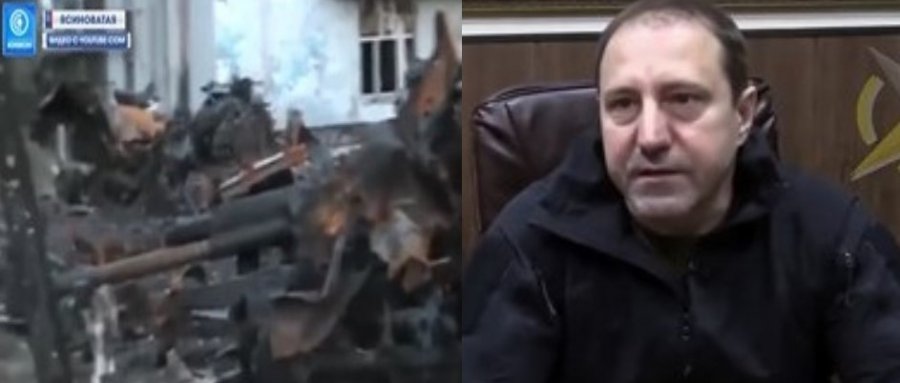Donbas insurgent admits he bombed Ukrainian city while Russia blames Ukraine

For seven years now, Russia and its proxy ‘republics’ in Donbas have been pushing certain key propaganda myths, including the claim that the Ukrainian Armed Forces bombed the city of Yasynovata in the Donetsk oblast in August 2014. They even provide shocking video footage, but either ignore, or hope that others have not seen the admission from a prominent Donetsk militant commander that it was his militants who bombed the city.
It is inconceivable that the Russian and militant propagandists do not know that they are lying. In demonstrating some of the propaganda clips, Ukrainian journalist Denis Kazansky points out that the reports do not even make sense. A recent report on UNION, a channel controlled by the so-called ‘Donetsk people’s republic’ [‘DPR]], asserts that fierce fighting began after Ukrainian forces entered the city. As Kazansky notes, this makes nonsense of the claims that residential areas came under attack from the Ukrainian soldiers. Why would they use heavy artillery to bomb themselves? That, however, is a question that could get you taken away by the so-called ‘DPR ministry of state security’, tortured and imprisoned for ‘spying’ or ‘treason’.
The worrying part of such propaganda is that most viewers would probably not even notice the dissonance. They would simply see the video footage of devastation and doubtless believe that “dozens of civilians were killed”. Unlike much of the propaganda in 2014 which used, for example, footage of phosphorous bombs from a different year and a different city, the damage shown to Yasynovata is genuine.
Only the culprits are neither interviewed, nor mentioned. This is despite the fact that Alexander Khodakovsky, one of the ‘’DPR field commanders’, has at least twice (first on social media in August 2019, then in the 2020 interview reported by Kazansky) openly admitted that he was behind the GRAD missile attack on Yasynovata. The propaganda does, however, incriminate him and point out his lies about what was, undoubtedly, a war crime. In both the post and his interview, Khodakovsky claims that there were no civilian casualties. “For the first time since the beginning of this war, I had to take a hard decision, to bomb my own city with rockets, but God is merciful – no civilians died, and there was even minimal destruction”.
Russian-controlled propaganda media have themselves provided vivid proof that this is not true. Kazansky is certainly right in noting that “in order to expose their propaganda, you don’t need any special operations or hacking of personal emails, etc. Because they are so hopelessly thick, the militants flounder in their own lies and, effectively, confess voluntarily to war crimes”.
Occasionally, former Russian ‘DPR’ leaders, like Igor Girkin go too far in their revelations and the material in question gets removed (making Kazansky’s videos particularly important.) In general, Moscow appears to tolerate militants’ wish to boast of their activities in Donbas, though there are certainly red lines they must not cross. One of these is the direct involvement of Russian military personnel and heavy artillery. Neither in the post, nor in the interview, for example, does Khodakovsky even mention how he and other ‘field commanders’ were able to take or hold Yasynovata and other cities in the summer of 2014, when the Ukrainian Army had seemed close to regaining control over the entire area.
In the middle of August 2014, Russia staged a first ‘humanitarian convoy’ stunt with 280 trucks sent to Donbas via the non-government-controlled part of the border. The world media were closely following these trucks, around half of which proved to be empty when finally seen. It is possible that they were emptied before that point, but it seems equally likely that this really was a staged event to, firstly, ensure that subsequent convoys were not subjected to such scrutiny and, perhaps more importantly, to deflect attention from other movements over the same border. At around the same time, for example, Polish journalists from TVN24 were filming huge convoys, often by night, heading towards the border and visibly carrying both soldiers and military equipment.
By the end of August 2014, there were already reports, first from Russian politician Lev Shlosberg and then some courageous Russian journalists about Russian military deaths in Donbas. Within days, a macabre farce began where the widow who had reported her husband’s death began denying it to reporters and handing the phone over to a person whom she claimed to be her husband. The latter, and others, had been killed, as a later journalist investigation has confirmed from gravestones and monuments.
By 2019, Russian President Vladimir Putin had signed into force a law aimed at preventing divulgence of information about Russia’s military engagement in Ukraine and other countries. Had the law been in force in July 2014, crucial information about the secret transportation to Ukraine of a Russian BUK missile carrier and its use in downing Malaysian Airliner MH17 would have never come to light. The same applies to other revelations that can serve as evidence of war crimes at the International Criminal Court at the Hague.
In fact, other militants have continued with revelations, not only about their own war crimes, but about Russia’s military role in what Moscow, and some pro-Russian Ukrainians, are still trying to palm off as a ‘civil war’ in eastern Ukraine.
See:
Former Donbas militant leader admits ‘republics’ exist because of Putin and Russia
Key insurgent admits there was no civil war, just Russian aggression
For direct evidence that Russia’s convoys of death never stopped, see:
Covid19 used to block OSCE monitors while Russia continues bringing war to Ukraine by night





